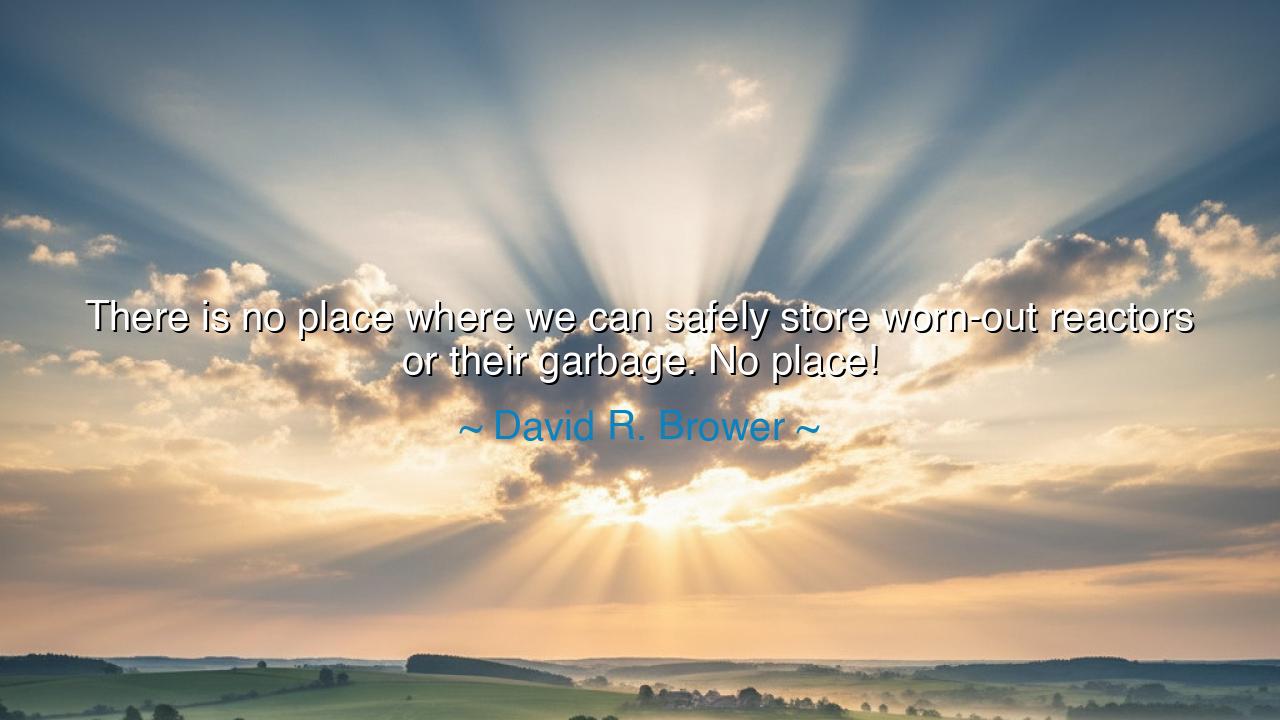
There is no place where we can safely store worn-out reactors or
There is no place where we can safely store worn-out reactors or their garbage. No place!






When David R. Brower cried out, “There is no place where we can safely store worn-out reactors or their garbage. No place!” he was not merely warning about technology—he was delivering a prophecy about the hubris of humanity. His words, fierce and unrelenting, echo like the thunder of an ancient oracle, condemning not only a single age but the recurring folly of civilizations that mistake power for wisdom. Brower, a great defender of the Earth and founder of the modern environmental movement, saw the dawn of the nuclear age not as triumph but as tragedy. For he understood that no invention of man can transcend the laws of nature, and that to create something whose poison lasts for millennia is to bind future generations in chains of invisible fire.
This quote was born from the age of atomic arrogance, when nations, drunk on the promise of limitless energy, split the atom and declared themselves gods of creation. In the 1950s and 60s, the world was intoxicated with the dream of nuclear power—cheap, efficient, and eternal. But Brower, a prophet among pragmatists, saw beyond the glow of the reactor. He saw the shadow of its waste, the deadly residue that would outlive empires, the unseen curse buried in the earth. He saw that while man could build a reactor, he could not build a tomb strong enough to contain eternity. Hence his cry: “No place!”—a warning not of logistics, but of moral impossibility. There can be no safe resting place for that which defies the lifespan of the planet itself.
In the manner of the ancients, Brower’s words summon memories of fallen civilizations. Think of Icarus, who flew too close to the sun on wings of wax, his ambition melting into ruin. Or recall the builders of Babel, who sought to climb the heavens and found instead the chaos of their own pride. So it is with the nuclear age: mankind, in his hunger for control, has torn open the core of the atom, only to find that what lies within cannot be tamed. Brower’s warning is thus an echo of those timeless lessons—the law of balance, the sacred rule that what is unleashed without reverence will return as destruction. The gods of fire, whether mythic or atomic, always demand their price.
His prophecy has already come to pass in places like Chernobyl and Fukushima, where the arrogance of safety was swallowed by catastrophe. The forests of Chernobyl, still glowing with invisible death, stand as Brower’s monument. The rivers around Fukushima whisper his words in poisoned tongues. The “garbage” he spoke of—the nuclear waste that cannot be buried, burned, or dissolved—remains humanity’s most haunting inheritance. Each barrel, each rod, is a testament to the blindness of progress ungoverned by humility. We have created materials that outlive history itself, yet we cannot promise that the ground we bury them in will remain unbroken. Mountains erode. Seas rise. Stone decays. Time mocks all containment.
Yet Brower’s lament is not only a dirge—it is also a call to conscience. He does not speak to condemn human ingenuity, but to remind us that true intelligence includes foresight and restraint. To create is divine, but to create wisely is salvation. The problem is not the pursuit of energy, but the abandonment of reverence. For the Earth, vast as she is, has limits. Her womb cannot forever conceal the sins of her children. When Brower says there is “no place,” he means that the planet itself rejects such burial; that the soil, the ocean, the air—all are part of one sacred body that cannot safely absorb the poisons of pride.
The ancient philosophers would have called Brower’s warning a lesson in natural justice—the law that governs all things, visible and unseen. Nature has always balanced itself, but mankind, in his impatience, has severed that balance. He digs deep, splits atoms, burns forests, and then wonders why the earth trembles beneath him. Brower’s truth is a call to return to the covenant of stewardship—to live not as conquerors, but as caretakers of a world that has endured longer than any empire. He reminds us that the greatest danger is not the reactor, but the forgetfulness of the heart—the belief that we are separate from the consequences of our own creation.
So let the teaching of David Brower be remembered as a commandment for the ages: Do not build what you cannot unbuild. Do not create what you cannot contain. Do not wound the Earth with that which cannot heal. Seek not the glory of power, but the peace of wisdom. Let innovation walk beside reverence, and let ambition be tempered by humility. For there truly is no place—no mountain, no ocean, no vault—that can protect us from the arrogance of our own making. The only safe place is within wisdom itself—a heart that remembers the limits of life, and a civilization that chooses harmony over hubris.






AAdministratorAdministrator
Welcome, honored guests. Please leave a comment, we will respond soon